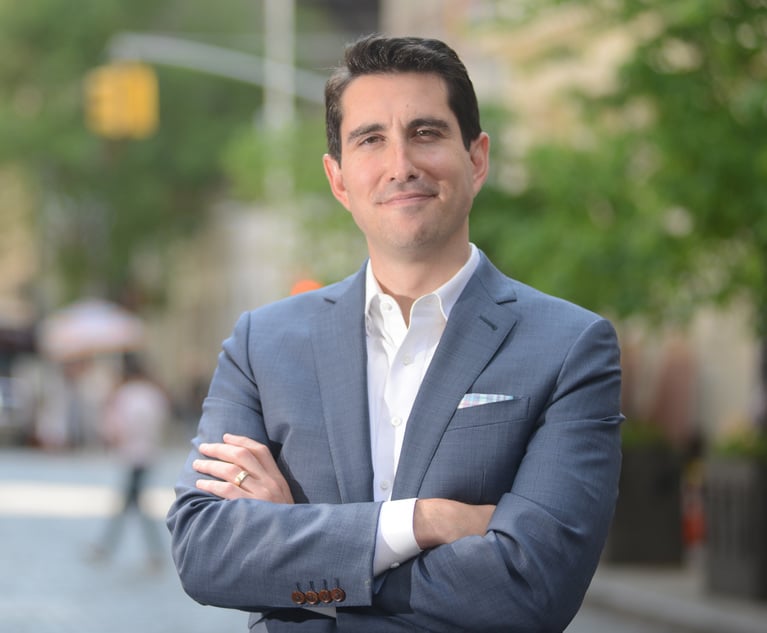Bay Area's In-House Lawyers Find Collaborative, Cross-Company Communities
“The bar is high in the Bay because we don't have to start each conversation at a higher level. We understand each other,” said one legal ops leader.
March 09, 2018 at 12:09 PM
5 minute read
 (Photo: kropic1/Shutterstock.com)
(Photo: kropic1/Shutterstock.com) It's a Tuesday night, and the top floor of a bar in San Francisco's SoMa neighborhood is filled with lawyers. Most people are dressed casually in jeans, and there's a puppy on the couch. It's a happy hour event hosted by the Bay Area In-House Lawyers group, and while it's casual and laid back, attendees are exchanging real career advice, discussing job openings and moves and making authentic connections with other corporate counsel.
It's not an unusual scene in the Bay Area, where in-house attorneys, many of whom work for technology companies, have formed especially tight-knit communities that have helped them share knowledge and grow in their careers. The ability to reach outside the usual realm of their own legal departments to make contacts and exchange best practices has propelled them forward.
“It's a fantastic vibrant community,” Jobe Danganan, chair of the in-house counsel section of the Bar Association of San Francisco and new general counsel of Credible, said of the Bay Area. “We collaborate and learn from each other. It's a healthy environment for in-house lawyers to thrive in.”
BAIL and the in-house counsel section of BASF are two of many organizations that connect corporate counsel in the Bay Area. Those connections are helpful, Danganan says, for in-house lawyers looking to make informed decisions.
“It's incredibly helpful for in-house counsel dealing with outside lawyer firms, dealing with employees, dealing with leadership teams, and beyond that,” he said.
➤➤ Get in-house news and commentary straight to your in-box with Inside Track from Law.com. Learn more and sign up here.
Danganan praised BASF's practical tools, such as its listserv. “People post general questions, open-ended questions that don't disclose the issues within the company, but it's a collaborative community where folks can help each other,” he noted.
These communities on the Bay's legal landscape can be especially useful for smaller legal departments and younger in-house lawyers who are just starting out, according to Linsey Morrison, associate general counsel, product and policy at Eventbrite.
Morrison has worked in-house since 2005, right after graduating from UC Hastings College of the Law, and she's seen many newer corporate counsel benefit from the resources available.
“I've always found it very collaborative. It probably stems from the fact that there's a lot of smaller companies out here willing to take a lot of newer attorneys in-house,” Morrison said. “Younger attorneys in-house are doing a variety of things without a huge legal department, so it becomes a necessity to reach out to a lot of attorneys in the same position and luckily in the Bay you find that.”
Even as she has become a more-seasoned lawyer, Morrison has been able to ask in-house lawyers at other tech companies for advice when her work raises new and unfamiliar legal questions. Facing these quandaries is fairly common in the region, where many tech attorneys are working in cutting edge areas that may lack fully formed legal and regulatory frameworks.
The collaborative environment and high density of tech companies and lawyers has also helped grow a community for those in legal operations—an increasingly important part of many in-house teams. Connie Brenton, chief of staff and director of Legal Operations at NetApp Inc. and president and chief executive officer of Corporate Legal Operations Consortium (CLOC), says that the legal ops community has taken off especially quickly in the Bay.
“Collaborations and sharing of best practices and creativity is part of the DNA of the Bay Area, part of the DNA of most of the companies, and so it's an extension of that culture and that mindset as CLOC started to develop,” Brenton said. “There wasn't fear, there wasn't a lot of holding information close to the chest, we really wanted to help each other create efficient legal departments. It's a win-win.”
Now, Brenton says the Bay Area's community feel and early adoption of CLOC has allowed the legal ops field to grow, increasing the number of people trained in operations and the confidence in those working in the role.
“We've been meeting with each other for 10 years. There's a lot of history and trust and sharing of best practices,” she said. “The bar is high in the Bay because we don't have to start each conversation at a higher level. We understand each other. We understand each others' businesses, we've shared documents and processes for long periods of time. It's like having a friend that you grew up with.”
That's not to say the Bay Area is the only place where in-house attorneys have formed close communities. Since CLOC began, the group has spread across the U.S. and to other countries. On a national scale, there are groups such as In The House, which connects in-house lawyers nationwide for networking and knowledge sharing, leveraging the power of group text chats, video sessions and other tech. New York-based groups TechGC and New York Legal Tech Meetup are working to form their own strong in-house communities.
“We do want to help eliminate those [geographical] boundaries to networking with other in-house counsel,” said Chris Colvin, the general counsel and founder of In The House. “It's equally valuable to reach out and connect with people in different geographies who might share your niche.”
This content has been archived. It is available through our partners, LexisNexis® and Bloomberg Law.
To view this content, please continue to their sites.
Not a Lexis Subscriber?
Subscribe Now
Not a Bloomberg Law Subscriber?
Subscribe Now
NOT FOR REPRINT
© 2025 ALM Global, LLC, All Rights Reserved. Request academic re-use from www.copyright.com. All other uses, submit a request to [email protected]. For more information visit Asset & Logo Licensing.
You Might Like
View All
Kraken’s Chief Legal Officer Exits, Eyes Role in Trump Administration
3 minute read

Collectible Maker Funko Wins Motion to Dismiss Securities Class Action

How Tony West Used Transparency to Reform Uber's Toxic Culture
Trending Stories
- 1Being a Profession is Not Malarkey
- 2Bring NJ's 'Pretrial Opportunity Program' into the Open
- 3High-Speed Crash With Police Vehicle Nets $1.6 Million Settlement
- 4Embracing a ‘Stronger Together’ Mentality: Collaboration Best Practices for Attorneys
- 5Selling Law. How to Get Hired, Paid and Rehired
Who Got The Work
J. Brugh Lower of Gibbons has entered an appearance for industrial equipment supplier Devco Corporation in a pending trademark infringement lawsuit. The suit, accusing the defendant of selling knock-off Graco products, was filed Dec. 18 in New Jersey District Court by Rivkin Radler on behalf of Graco Inc. and Graco Minnesota. The case, assigned to U.S. District Judge Zahid N. Quraishi, is 3:24-cv-11294, Graco Inc. et al v. Devco Corporation.
Who Got The Work
Rebecca Maller-Stein and Kent A. Yalowitz of Arnold & Porter Kaye Scholer have entered their appearances for Hanaco Venture Capital and its executives, Lior Prosor and David Frankel, in a pending securities lawsuit. The action, filed on Dec. 24 in New York Southern District Court by Zell, Aron & Co. on behalf of Goldeneye Advisors, accuses the defendants of negligently and fraudulently managing the plaintiff's $1 million investment. The case, assigned to U.S. District Judge Vernon S. Broderick, is 1:24-cv-09918, Goldeneye Advisors, LLC v. Hanaco Venture Capital, Ltd. et al.
Who Got The Work
Attorneys from A&O Shearman has stepped in as defense counsel for Toronto-Dominion Bank and other defendants in a pending securities class action. The suit, filed Dec. 11 in New York Southern District Court by Bleichmar Fonti & Auld, accuses the defendants of concealing the bank's 'pervasive' deficiencies in regards to its compliance with the Bank Secrecy Act and the quality of its anti-money laundering controls. The case, assigned to U.S. District Judge Arun Subramanian, is 1:24-cv-09445, Gonzalez v. The Toronto-Dominion Bank et al.
Who Got The Work
Crown Castle International, a Pennsylvania company providing shared communications infrastructure, has turned to Luke D. Wolf of Gordon Rees Scully Mansukhani to fend off a pending breach-of-contract lawsuit. The court action, filed Nov. 25 in Michigan Eastern District Court by Hooper Hathaway PC on behalf of The Town Residences LLC, accuses Crown Castle of failing to transfer approximately $30,000 in utility payments from T-Mobile in breach of a roof-top lease and assignment agreement. The case, assigned to U.S. District Judge Susan K. Declercq, is 2:24-cv-13131, The Town Residences LLC v. T-Mobile US, Inc. et al.
Who Got The Work
Wilfred P. Coronato and Daniel M. Schwartz of McCarter & English have stepped in as defense counsel to Electrolux Home Products Inc. in a pending product liability lawsuit. The court action, filed Nov. 26 in New York Eastern District Court by Poulos Lopiccolo PC and Nagel Rice LLP on behalf of David Stern, alleges that the defendant's refrigerators’ drawers and shelving repeatedly break and fall apart within months after purchase. The case, assigned to U.S. District Judge Joan M. Azrack, is 2:24-cv-08204, Stern v. Electrolux Home Products, Inc.
Featured Firms
Law Offices of Gary Martin Hays & Associates, P.C.
(470) 294-1674
Law Offices of Mark E. Salomone
(857) 444-6468
Smith & Hassler
(713) 739-1250






